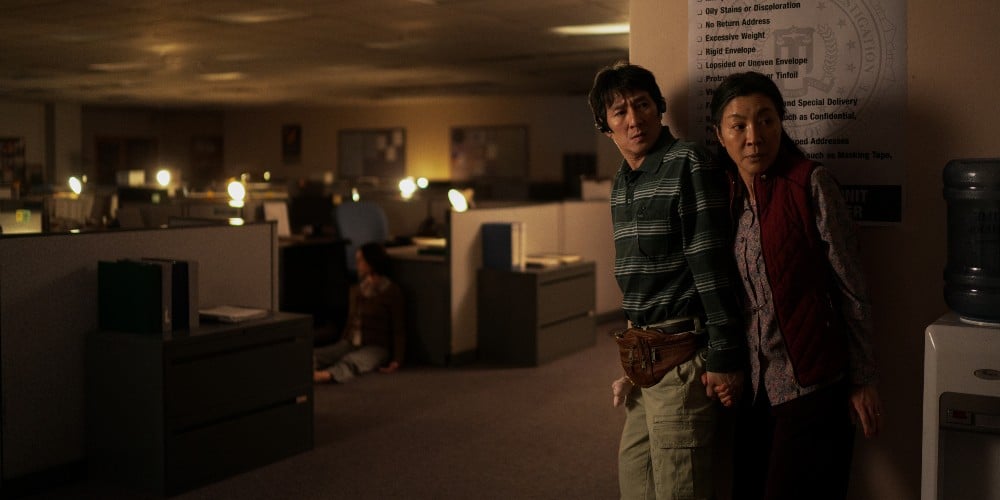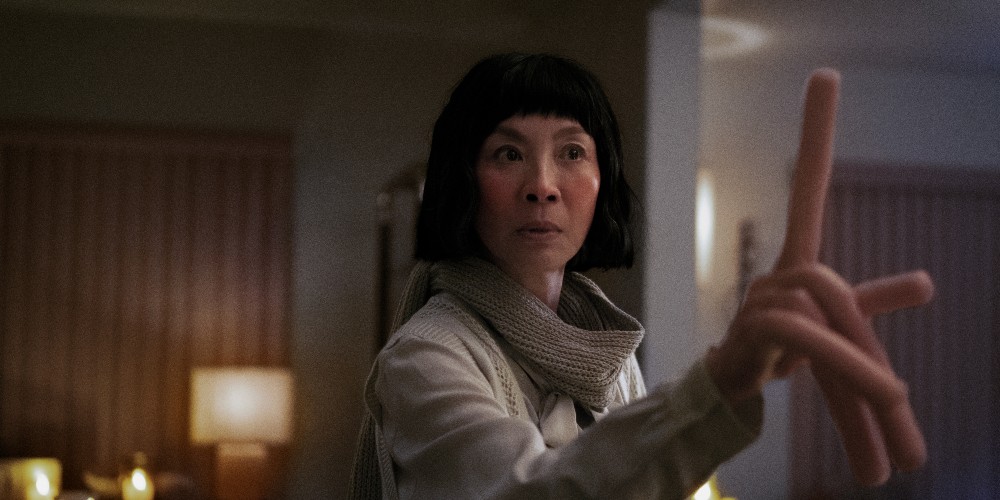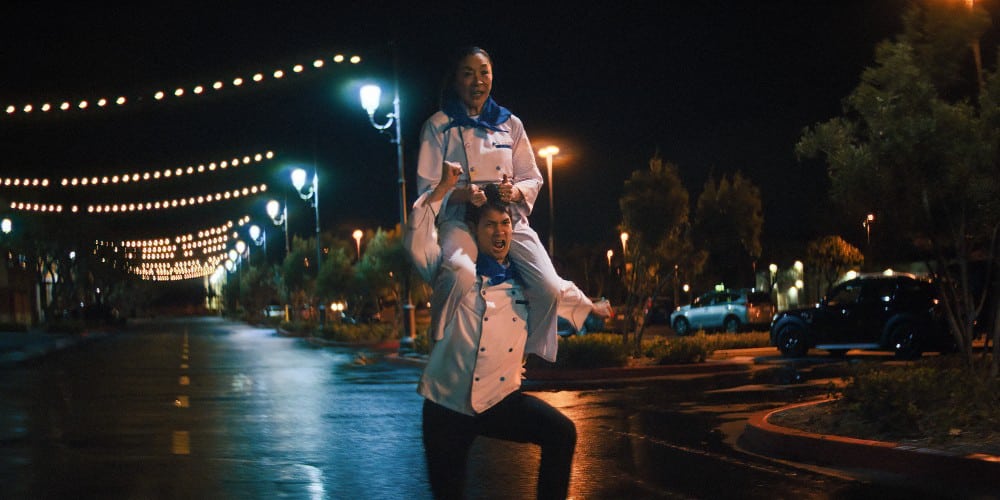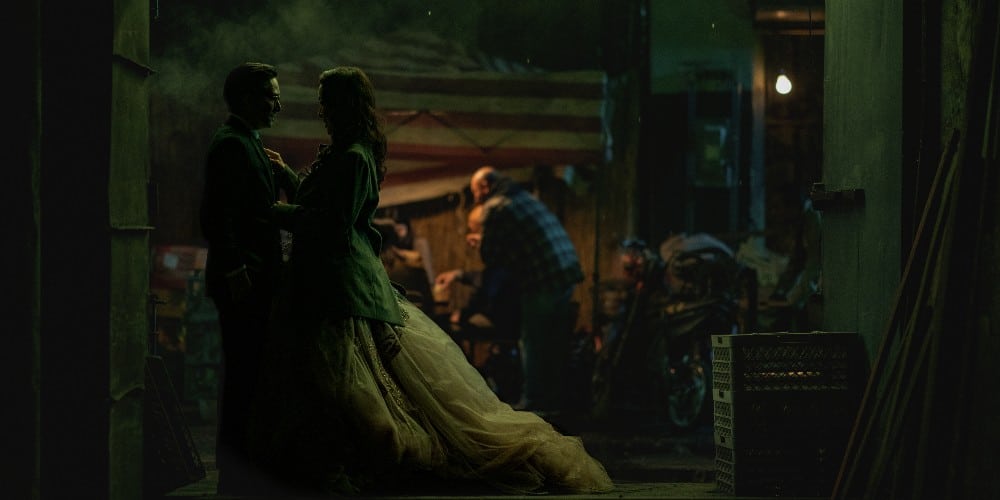Everything Everywhere All at Once is both a glorious reminder of the multitude of ways Michelle Yeoh rules and a smart study of the work that goes into doing good.
Everything Everywhere All at Once is glorious.
Its protagonist, unhappy-jerk-turned-possible-savior-of-the-multiverse Evelyn Wang, is a vehicle for Michelle Yeoh—one of cinema’s all-time A-Number-One greats—to showcase her vast and far-ranging talents (Martial arts! Music! Physical comedy! Internal and external performance both solo and paired!) and a compelling, dimensional (sorry) lead whose personal development is moving. Directors Daniels (Daniel Kwan and Daniel Scheinert, Swiss Army Man) maintain a precise tonal balance throughout the picture’s many hops in feel and form—and execute the hops themselves with similar skill and style.
Whether paying homage to Wong Kar-wai or capturing Evelyn’s one-against-two battle to keep decidedly stylized IRS employee trophies from going somewhere it was both absolutely meant and never ever meant to go, Everything Everywhere All at Once deftly maintains its emotional and narrative coherency. As far afield as the picture’s assorted acts and sequences get from one another, its core—Evelyn—remains constant.

Evelyn is a tremendous role, even setting aside the opportunities her parallel universe selves give Yeoh to flex. She begins Everything Everywhere All at Once a frustrated, fraying, jerk. She’s a deeply unhappy woman whose determined insistence that things are fine has pushed her relationships with her husband Waymond (Ke Huy Quan of Temple of Doom and The Goonies fame) and daughter Joy (Stephanie Hsu) to their breaking points. Waymond loves Evelyn but does not want to be in a relationship that’s making both of them unhappy. Joy feels isolated from Evelyn who, despite her protestations, doesn’t truly accept Joy’s sexuality or identity.
At a critical meeting with Jamie Lee Curtis‘ IRS auditor, a cool, confident Waymond from a parallel universe hijacks Evelyn’s sweet but seemingly milquetoast husband to warn her that she and all of existence are in grave danger. The dam breaks. As multiple parties (a superhuman, nihilistic counterpart to Joy calling herself Jobu Tupaki and her forces and the ruthless anti-Jobu paramilitary Alphaverse led by a version of Evelyn’s semi-estranged father [living legend James Hong]) lay siege to the IRS’ office, multiversal skill load-ins blazing, Evelyn must face the life she has lived—in part by witnessing who she might have been.
Yeoh plays each Evelyn that the prime Evelyn hops into differently; the glamorous, very-much-like-Michelle-Yeoh-herself movie star who encounters the Waymond she never left home with after time has made him world-weary and wise; the talented but distracted chef who’s suspicious of a newcomer whose cooking skills seem almost superhuman; the woman from the Earth where everyone has useless wobbly hotdogs for hands and vomits condiments when upset; the almost-her who successfully navigated the IRS audit. Yet, while the many Evelyns have lived vastly different lives, Yeoh weaves a specific melancholy discontent into each of them.

Evelyn, no matter her success or failures, is always searching for something that she cannot quite name—a satisfaction and self-acceptance she has never quite found. If Prime Evelyn is the most dramatic example of this (per parallel Waymond, if the multiverse is determined by choices, Prime Evelyn made the wrong choice every time) her counterparts share in the sense that something is missing, that somehow nothing they have done matters. In one universe, this manifests as a fraught and longing conversation with her dashing lost love amidst the glow of nighttime streets. In others, it takes different forms.
Yeoh plays every Evelyn fabulously, all the while guiding the Prime Evelyn through changes both massive (the first appearance of parallel Waymond and her apparent duty to save existence) and intimate (realizing that she is repeating the same mistakes with Joy that her father made with her, actually listening to Waymond when he lays out how he navigates an absurd, cruel, world and why). Her fight scenes, which include everything from elegant, hard-hitting martial arts to creatively deployed sign-spinning, are gorgeously choreographed and skillfully performed.
And as great action performers do, Yeoh develops Evelyn’s character through her fights. She moves from confused to confident to vicious to enlightened and deliberately joyful. Seeing Yeoh fight is never less than a joy. If Everything Everywhere All at Once‘s virtues only amounted to Yeoh’s great work, it would still be a fantastic movie. She’s one of the great living actors, and Evelyn and her assorted counterparts stand among her finest performances.

But Everything Everywhere All at Once lives up to its title. In addition to Yeoh, it boasts an ensemble that ably matches her. Hsu and Quan are similarly excellent in balancing multiple roles. Hsu deftly shifts between Joy’s anxiety and frustration and Jobu Tupaki’s semi-gleeful chaotic nihilism. Quan’s Waymonds: the sweet-hearted goof, the daring and heartbroken action hero, and the introspective might-have-been lover are show-stopping work. Like Yeoh, Quan captures a melancholy that Waymond carries with him no matter his life—a melancholy he processes in different ways, the solution to which marks Everything Everywhere All at Once as full-on wise.

Amidst the impeccable craft of its action sequences (choreographed by Martial Team‘s Andy Le), the Daniels’ rapid-fire multi-faceted comedy (source of the picture’s one weak point—it’s extremely funny, but personally some of its scatological/gross-out jokes wear out their welcome), and Larkin Seiple (who also lensed Swiss Army Man)’s gorgeous cinematography, Everything Everywhere All at Once offers a remarkable and clear-eyed counter-argument to nihilism as an escape from despair and disappointment.
Everything Everywhere All at Once argues that to live with kindness is not to traipse about with Pollyannaish callousness, and vague declarations of “HOPE!”, it is to engage with the world. It is to gamble that goodness put out into the world will spark a spread. It is to admit the possibility of failure and to make the wager anyway, for one’s own sake as much as anything else. It takes work, and Yeoh, Quan, their fellow actors, and the Daniels do that work stupendously.
The more I think about Everything Everywhere All at Once, the more I dig it. It’s a worthy celebration of Michelle Yeoh. It’s a hell of a return to major roles for Ke Huy Quan. It boasts superb action and (minus a few jokes overstaying their welcome) it’s screamingly funny. Plus, hey, James Hong gets a combat exosuit. That just plain rules.
Everything Everywhere All at Once is now playing in select theaters and expands to a wider release this Friday, April 8th.
Everything Everywhere All at Once trailer:
Read next: The Spool's Best New Releases
Streaming guides
The Best Live TV Streaming Services With Free Trial
The praises of live TV streaming services don’t need to be further sung. By now, we all know that compared to clunky, commitment-heavy cable, live TV is cheaper and much easier to manage. But just in case you’re still on the fence about jumping over to the other side, or if you’re just unhappy with ... The Best Live TV Streaming Services With Free Trial
How to Watch Power Book III: Raising Kanan Season 3
Season 3 of the hotly anticipated Power spin-off, Power Book III: Raising Kanan, is arriving on Starz soon, so you know what that means: it’s the ’90s again in The Southside, and we’re back with the Thomas family as they navigate the ins and outs of the criminal underworld they’re helping build. Mekai Curtis is ... How to Watch Power Book III: Raising Kanan Season 3
How to Watch Doctor Who: 60th Anniversary Specials
Ladies and gentlemen, we’re so back! To celebrate Doctor Who’s 60th anniversary, the BBC is producing a three-episode special starring none other than the Tenth/Fourteenth Doctor himself, David Tennant. And to the supreme delight of fans (that would be me, dear reader), the Doctor will be joined by old-time companion Donna Noble (Catherine Tate) and ... How to Watch Doctor Who: 60th Anniversary Specials
Which Netflix Country has Interstellar?
Maybe you’ve just seen Oppenheimer and have the strongest urge to marathon—or more fun yet, rank!—all of Christopher Nolan’s films. Or maybe you’re one of the few who haven’t seen Interstellar yet. If you are, then you should change that immediately; the dystopian epic is one of Nolan’s best, and with that incredible twist in ... Which Netflix Country has Interstellar?
Which Netflix Country Has Each Movie of The Hunger Games?
For whatever reason, The Hunger Games series isn’t available in the same countries around the world. You’ll find the first and second (aka the best) installments in Hong Kong, for instance, but not the third and fourth. It’s a frustrating dilemma, especially if you don’t even have a single entry in your region, which is ... Which Netflix Country Has Each Movie of The Hunger Games?
How to Watch ESPN With A Free Trial
One of the major concerns people have before cutting the cord is potentially losing access to live sports. But the great thing about live TV streaming services is that you never lose that access. Minus the contracts and complications of cable, these streaming services connect you to a host of live channels, including ESPN. So ... How to Watch ESPN With A Free Trial
How to Watch Paramount Network With a Free Trial
To date, Paramount Network has only two original shows on air right now: Yellowstone and Bar Rescue. The network seems to have its hands full with on-demand streaming service Paramount+, which is constantly stacked with a fresh supply of new shows. But Yellowstone and Bar Rescue are so sturdy and expansive that the network doesn’t ... How to Watch Paramount Network With a Free Trial
How to Watch WE TV With a Free Trial
Previously “Women’s Entertainment,” We TV has since rebranded to accurately reflect its name and be a more inclusive lifestyle channel. It’s home to addictive reality gems like Bold and Bougie, Bridezillas, Marriage Boot Camp, and The Untold Stories of Hip Hop. And when it’s not airing original titles, it has on syndicated shows like 9-1-1, ... How to Watch WE TV With a Free Trial
How to Watch TNT Sports With A Free Trial
For many sports fans, TNT is a non-negotiable. It broadcasts NBA, MLB, NHL, college basketball, and All Elite Wrestling matches. And, as a bonus, it also has reruns of shows like Supernatural, Charmed, and NCIS, as well as films like The Avengers, Dune, and Justice League. But while TNT used to be a cable staple, ... How to Watch TNT Sports With A Free Trial
How to Watch Comedy Central With a Free Trial
It’s no coincidence that many of today’s biggest comedians found their footing on Comedy Central: the channel is a bastion of emerging comic talents. It served as a playground for people like Nathan Fielder (Fielder For You), Ilana Glazer and Abbi Jacobson (Broad City), Tim Robinson (Detroiters), and Dave Chappelle (Chappelle’s Show) before they shot ... How to Watch Comedy Central With a Free Trial
How to Watch FX With a Free Trial
You’d be hard-pressed to find a bad show airing on FX. The channel has made a name for itself as a bastion of high-brow TV, along with HBO and AMC. It’s produced shows like Atlanta, Fargo, The Americans, Archer, and more recently, Shogun. But because it’s owned by Disney, it still airs several blockbusters in ... How to Watch FX With a Free Trial